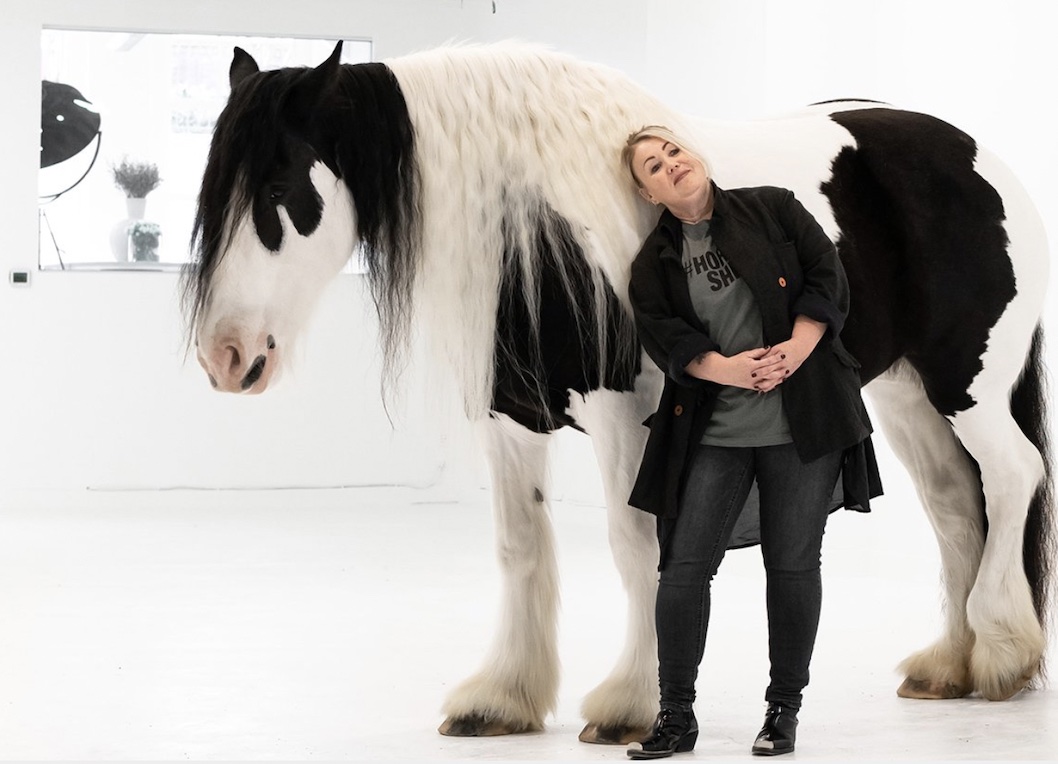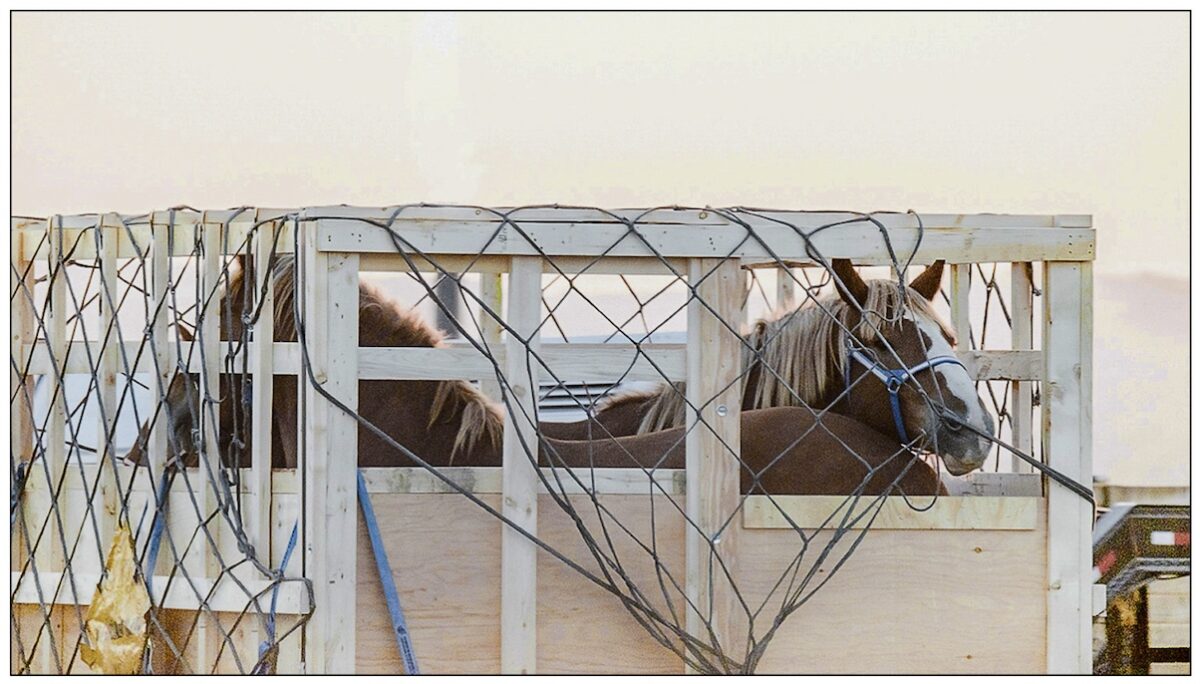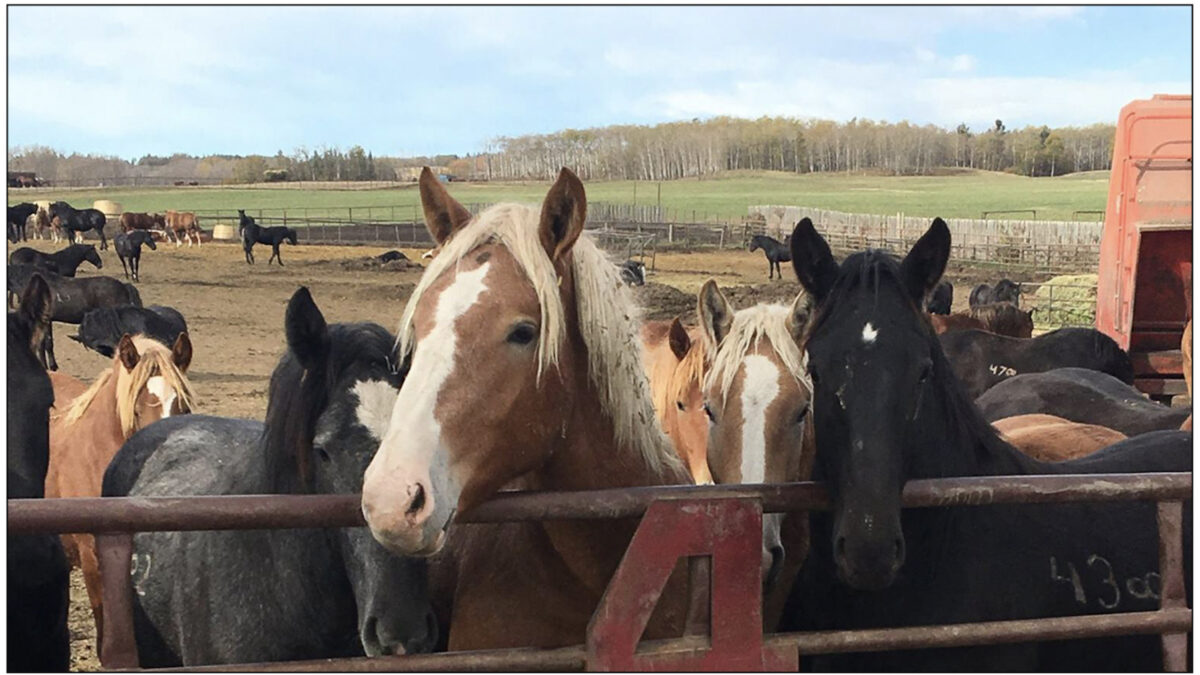Animal rights advocates in Canada recently celebrated what they’re calling a “big step” in the House of Commons but a “small win” in the overall fight to end the export of live horses overseas for human consumption.
Every year, according to the Canadian Horse Defence Coalition, thousands of Canadian horses are bred and fattened in feedlots in Alberta and Manitoba and then flown to Japan and other countries to be slaughtered for fresh horsemeat for human consumption.
Since 2013, more than 40,000 live horses have been shipped from Canada to Japan for this practice, says the Orangeville, Ont.-based CHDC.
Under the Health of Animals Regulations, large horses can be transported for up to 28 hours in small wooden crates without food, water or rest. “These horses are not trained for travel like show horses, and they are in really confined places that put them at risk of injuries during takeoff and landing and especially high levels of stress, thirst, panic, fear and hunger, and it increases the risk of illness as well,” said Kaitlyn Mitchell, director of legal advocacy for Animal Justice, a national animal law advocacy organization based in Toronto.
Members of Parliament have begun to take action with the introduction of Bill C-355, which aims to ban the export of live horses from Canada, by air, to countries overseas for slaughter and human consumption.
The bill, which was tabled in September by Ontario Liberal MP Tim Louis, had its second reading in The House of Commons on Jan. 31 and members of Parliament voted 181-137 in favour of moving the bill forward. The bill will now be reviewed by the House committee on agriculture and agri-food before an eventual third reading and vote, and then on to the Senate for potential final approval.
“Making it past second reading vote and making it to the committee is a really, really big step,” Mitchell said. “It certainly is not the end of the process, but it is really important, and we are really happy the bill has made it this far.”

Advocates have been calling for an end to the horsemeat industry in Canada — and the practice of exporting live horses for consumption — for years.
Canadian musician, actor and animal rights advocate Jann Arden initiated a campaign called Horseshit in attempt to raise awareness in Canada and put an end to the practice. “Before people had no idea, so we are really proud of that change of narrative,” said Arden, an eight-time Juno Award winner, in an interview with Capital Current. “I’m telling you, 99 per cent of people I’ve talked to are absolutely horrified” to learn about the exporting and slaughtering of Canadian horses.
‘Before people had no idea, so we are really proud of that change of narrative. I’m telling you, 99 per cent of people I’ve talked to are absolutely horrified.’
— Jann Arden, musician and animal rights advocate, on her ‘Horseshit’ campaign
Arden said she has seen first-hand the harsh conditions horses face during the transportation process.
“I’ve been to loads at the airports many times and it’s so heartbreaking” she said.
All donations from Arden’s Horseshit campaign go to the Canadian Horse Defence Coalition, a registered not-for-profit organization that has been working to end the practice of horsemeat slaughter in Canada for the last 20 years.
The group has specifically been working to end the export of live horses to Japan since 2012.
Sinikka Crosland, the executive director of CHDC, explained to Capital Current she is opposed to the slaughter of horses for humane reasons.
“I feel we can bond with horses the same way we can with dogs and cats,” Crosland said.
“Horses for many people are a companion animal, working partners. They are cherished and they’ve had a big place in history plowing fields and helping humankind,” she said. “So I feel that we owe it to them to make sure that they are protected.”

Crosland said she is frustrated with what she describes as the mistreatment of the animals in the horsemeat industry and does not think the industry in Canada or overseas is necessary.
“How many species do we actually need to exploit?” Crosland said. “Do we need to kill horses for meat? What’s the next step? Would we consider killing dogs and cats? Aren’t we going to draw the line somewhere?”
Live horses are shipped from Canada to Japan for fresh horsemeat used for food like sashimi, a Japanese delicacy.
“(The exportation and slaughtering of Canadian horses) is completely unnecessary and can’t be justified,” Mitchell said. “It’s done only to serve a very niche, wealthy market in Japan for the product of raw horse sashimi. Ending this practice will not adversely impact food security.”
If Bill C-355 becomes law, live horses could no longer be exported overseas for human consumption, but they could still be slaughtered in Canada for domestic use. The meat could still be sent overseas for human consumption.
Not all experts are in support of Bill C-355 and its aim to end the export of live horses.
Jennifer Woods, an Alberta-based animal welfare specialist and auditor, has been examining the transportation of horses being exported from Canada to Japan since 2017. Woods said she cares deeply about the welfare of all animals, including horses, but does not believe the transportation of the horses is inhumane. She said those involved in the market are meeting Canadian regulations and international standards.
“The reason that people believe (the exporting of horses) is inhumane is because the animals are cramped, but they’re actually not cramped at all. The horses are allocated more space than they’re required to have,” Woods said.
‘It comes down to some people not believing horses should be consumed for meat. But three billion people around the world consume horse meat, including in Quebec.’
— Jennifer Woods, Alberta-based animal welfare specialist
Woods said she believes the resentment towards the horsemeat industry is due to a cultural discomfort with the idea of eating horsemeat.
“It comes down to some people not believing horses should be consumed for meat,” Woods said. “But three billion people around the world consume horse meat, including in Quebec.”
For Woods, the most important thing is that all animals destined for human consumption are treated well during their lifetime, including their care, feeding and transportation.
“My job is welfare and there is nothing illegal about the (horsemeat industry),” Woods said.
But Arden said some horses have died during the journey overseas, collapsed, broken limbs and experienced severe injury.
“We will be pushing very hard to have the bill pass,” Mitchell said. She insisted that “it is clear the export process causes unimaginable suffering to the horses.”
As Bill C-355 continues its way through the House of Commons, advocates are recommending that concerned Canadians reach out to their local MPs to urge them to support the bill.
“We have to keep the pressure up. People have to put their hands in the air and go ‘I don’t like this, and we need to stop this,’ because that’s what democracy is,” Arden said. “You have to dare to care — it’s as simple as that.”

